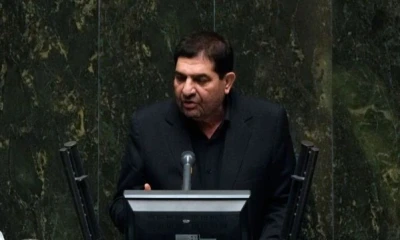Iran’s Acting President Mohammad Mokhber addressed the newly inaugurated parliament on Monday. It marks his first public appearance since the helicopter crash that claimed the lives of President Ebrahim Raisi and seven other officials last week.
As Iran prepares for a presidential election in a month, Mokhber’s address comes at a critical time. The election will determine Raisi’s successor, and Mokhber is seen as a potential candidate. Meanwhile, the newly elected hard-line parliament is set to choose its speaker on Tuesday.
In his speech, Mokhber lauded Raisi’s accomplishments, particularly in boosting Iran’s crude oil production to over 3.6 million barrels per day. Oil Minister Javad Owji recently stated that Iran is exporting about 2 million barrels daily, despite ongoing Western sanctions.
Mokhber highlighted the economic stability under Raisi’s leadership, even amid recent military actions in Iraq, Israel, and Pakistan. He attributed this stability to the guidance of Supreme Leader Ayatollah Ali Khamenei and Raisi’s efforts.
“Our economy remained stable despite our military engagements, thanks to the strong leadership of Ayatollah Raisi,” Mokhber declared. He noted the depreciation of the Iranian rial from 32,000 rials to $1 in 2015 to around 580,000 to $1 today, following the US withdrawal from the nuclear deal and increased regional tensions.
Foreign Ministry spokesman Nasser Kanaani, in his weekly briefing, reassured that Iran’s support for Palestine and resistance groups against Israel will continue unabated. Kanaani also affirmed ongoing efforts to lift sanctions through diplomatic channels.
On May 20, rescue teams recovered the bodies of Raisi, Foreign Minister Hossein Amirabdollahian, and others from a mountainous area in northwestern Iran after the fatal crash.
The upcoming presidential election, set for June 28, will see a five-day candidate registration period starting Thursday. Speculation is rife that Mokhber may run for the presidency.
Monday also marked the first session of Iran’s newly elected parliament, which saw the lowest voter turnout since the 1979 Islamic Revolution. The hard-liners now dominate the 290-seat body with over 230 seats. Although the parliament plays a secondary role in governance, it can exert significant pressure on the presidential administration regarding the budget and other key legislation. Ultimately, Supreme Leader Ayatollah Ali Khamenei holds the final authority on major state matters.

















